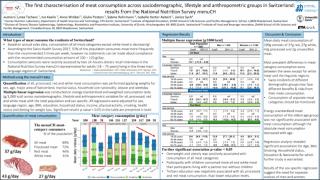Bitte benutzen Sie diese Kennung, um auf die Ressource zu verweisen:
https://doi.org/10.21256/zhaw-23891| Publikationstyp: | Konferenz: Poster |
| Art der Begutachtung: | Keine Angabe |
| Titel: | The first characterisation of meat consumption across sociodemographic, lifestyle and anthropometric groups in Switzerland : results from the National Nutrition Survey menuCH |
| Autor/-in: | Tschanz, Linda Kaelin, Ivo Wróbel, Anna Pestoni, Guilia Rohrmann, Sabine Herter-Aeberli, Isabelle Sych, Janice Marie |
| et. al: | No |
| DOI: | 10.21256/zhaw-23891 |
| Angaben zur Konferenz: | 58. Wissenschaftlicher Kongress der Deutschen Gesellschaft für Ernährung, online, 17.-19. Februar 2021 |
| Erscheinungsdatum: | 17-Feb-2021 |
| Verlag / Hrsg. Institution: | ZHAW Zürcher Hochschule für Angewandte Wissenschaften |
| Sprache: | Englisch |
| Fachgebiet (DDC): | 613.2: Diätetik 614: Public Health und Gesundheitsförderung |
| Zusammenfassung: | Background: Results from the National Nutrition Survey menuCH revealed that total meat intake exceeds the Swiss recommendation. The continuous discussion about the benefits and risks of consuming different types of meat prompted us to perform an in-depth analysis on meat intake in Switzerland. Objective: Investigation of associations of total, processed, red and white meat intake with selected sociodemographic, lifestyle and anthropometric variables. Methods: The menuCH survey (n = 2,057 aged 18-75), used to analyse average daily intake of total meat and main meat categories, includes data from two 24-h dietary recalls and an anthropometric and lifestyle questionnaire. For every meat category, we calculated energy-standardized average intake (g/1000 kcal) and investigated its association with 12 socio-demographic, lifestyle and anthropometric variables by multiple linear regression. Results: Average daily intake was 109 g/day of total, 43 g/ day of processed, 37 g/day of red, 27 g/day of white and 2 g/day of other meat. Energy-standardized total meat intake was highest in men, in the Italian-speaking region and in the youngest age group (18-29 years). Significant associations with total meat intake were negative for women compared to men, but positive for age of 18-29 years compared to 30-44 years, French- and Italian- compared to German-language regions and a BMI > 25/m2 compared to a BMI of 18.5-25/m2. Regression results of the three meat categories differed considerably. For example, we observed no significant difference between sexes for white meat intake, lower processed meat intake in French- than in German-language regions and higher total and processed meat intake in smokers compared to non-smokers. Conclusion: This study reveals significant differences in meat consumption with respect to amount and type in the Swiss population, suggesting that evidence-based risks and benefits of these categories might need more emphasis in meat consumption recommendations. |
| Weitere Angaben: | Book of Abstracts at https://www.dge.de/fileadmin/public/doc/wk/2021/DGE-Proc-Germ-Nutr-Soc-Vol-27-2021.pdf |
| URI: | https://digitalcollection.zhaw.ch/handle/11475/23891 |
| Volltext Version: | Publizierte Version |
| Lizenz (gemäss Verlagsvertrag): | Keine Angabe |
| Departement: | Life Sciences und Facility Management |
| Organisationseinheit: | Institut für Lebensmittel- und Getränkeinnovation (ILGI) |
| Publiziert im Rahmen des ZHAW-Projekts: | Was isst die Schweiz? |
| Enthalten in den Sammlungen: | Publikationen Life Sciences und Facility Management |
Dateien zu dieser Ressource:
| Datei | Beschreibung | Größe | Format | |
|---|---|---|---|---|
| 2021_Tschanz-et-al_Meat-consuption-accross-sociodemographic-lifestyle-anthroprometic-groups-Switzerland_Poster.pdf | 419.63 kB | Adobe PDF |  Öffnen/Anzeigen |
Zur Langanzeige
Tschanz, L., Kaelin, I., Wróbel, A., Pestoni, G., Rohrmann, S., Herter-Aeberli, I., & Sych, J. M. (2021, February 17). The first characterisation of meat consumption across sociodemographic, lifestyle and anthropometric groups in Switzerland : results from the National Nutrition Survey menuCH. 58. Wissenschaftlicher Kongress Der Deutschen Gesellschaft Für Ernährung, Online, 17.-19. Februar 2021. https://doi.org/10.21256/zhaw-23891
Tschanz, L. et al. (2021) ‘The first characterisation of meat consumption across sociodemographic, lifestyle and anthropometric groups in Switzerland : results from the National Nutrition Survey menuCH’, in 58. Wissenschaftlicher Kongress der Deutschen Gesellschaft für Ernährung, online, 17.-19. Februar 2021. ZHAW Zürcher Hochschule für Angewandte Wissenschaften. Available at: https://doi.org/10.21256/zhaw-23891.
L. Tschanz et al., “The first characterisation of meat consumption across sociodemographic, lifestyle and anthropometric groups in Switzerland : results from the National Nutrition Survey menuCH,” in 58. Wissenschaftlicher Kongress der Deutschen Gesellschaft für Ernährung, online, 17.-19. Februar 2021, Feb. 2021. doi: 10.21256/zhaw-23891.
TSCHANZ, Linda, Ivo KAELIN, Anna WRÓBEL, Guilia PESTONI, Sabine ROHRMANN, Isabelle HERTER-AEBERLI und Janice Marie SYCH, 2021. The first characterisation of meat consumption across sociodemographic, lifestyle and anthropometric groups in Switzerland : results from the National Nutrition Survey menuCH. In: 58. Wissenschaftlicher Kongress der Deutschen Gesellschaft für Ernährung, online, 17.-19. Februar 2021. Conference poster. ZHAW Zürcher Hochschule für Angewandte Wissenschaften. 17 Februar 2021
Tschanz, Linda, Ivo Kaelin, Anna Wróbel, Guilia Pestoni, Sabine Rohrmann, Isabelle Herter-Aeberli, and Janice Marie Sych. 2021. “The First Characterisation of Meat Consumption across Sociodemographic, Lifestyle and Anthropometric Groups in Switzerland : Results from the National Nutrition Survey menuCH.” Conference poster. In 58. Wissenschaftlicher Kongress Der Deutschen Gesellschaft Für Ernährung, Online, 17.-19. Februar 2021. ZHAW Zürcher Hochschule für Angewandte Wissenschaften. https://doi.org/10.21256/zhaw-23891.
Tschanz, Linda, et al. “The First Characterisation of Meat Consumption across Sociodemographic, Lifestyle and Anthropometric Groups in Switzerland : Results from the National Nutrition Survey menuCH.” 58. Wissenschaftlicher Kongress Der Deutschen Gesellschaft Für Ernährung, Online, 17.-19. Februar 2021, ZHAW Zürcher Hochschule für Angewandte Wissenschaften, 2021, https://doi.org/10.21256/zhaw-23891.
Alle Ressourcen in diesem Repository sind urheberrechtlich geschützt, soweit nicht anderweitig angezeigt.